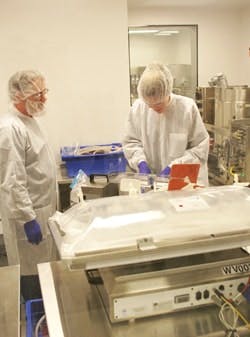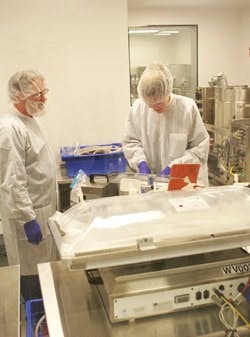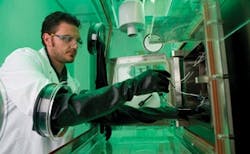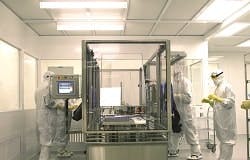The Road Ahead for Contract Service Excellence
Say what you will about contract manufacturing and services companies, but the operations they’ve got out on the road these days are driving more and more of the industry’s strategic successes — and that’s pretty exciting. While The Maybachs, Rolls-Royces and Cadillacs of Big Pharma were cruising rough roads, finding new strategic routes past cGMP construction zones and patent-cliff detours, The Aston-Martins, Porsches and Maseratis — Contract Pharma’s Grand Tourers — started downshifting, not only to better compete for the growing business opportunities that their executive-class clients were offering, but also to accelerate their own strategic ambitions as independent pharmaceutical manufacturing concerns.
Whether CMO, CDMO, CRO or some combination of all three, Contract Pharma is taking advantage of lighter, better handling operational platforms, high performance quality regimes and new sport-tuned process and information technologies to accelerate their capabilities and keep pace with the demand for their services.
Last summer, Catalent opened its new biomanufacturing facility in Madison, Wis. The new plant features state-of-the-art disposable technology and an efficient process layout that supports sterility and throughput.
ON INDUSTRY TRENDSPatheon’s Harry Gill, senior vice president, quality and continuous improvement, finds that for the customer market, “We are observing a shrinking fixed asset base among large Pharma, as there has been 4% CAGR decline since 2007.” He notes that more mid-sized and specialty pharmaceutical companies are maintaining core competencies in research and commercialization while outsourcing the rest. “Additionally,” says Gill, “we are noticing that more emerging biotech companies are using virtual outsourcing models and generic companies are outsourcing more of their complex products.”In 2012, says the August 2013 Frost & Sullivan report “Global Pharmaceutical Contract Manufacturing Market,” the global pharmaceutical contract manufacturing market generated $13.43 billion in revenue and a CAGR of 6.6% through 2017. Solid dose formulations comprise the largest segment, say Frost analysts, constituting 49.8% of the total CMO market, but point to injectable dose formulations as a primary outsourcing growth driver through the forecasted period with a strong 13% CAGR. Frost & Sullivan’s study points to several key drivers of this growth, including increasing demand for safe effective solid-dose generics and sterile products and increased focus on complex disease therapies answered by lyophilized and sterile cytotoxics for oncological disease management. Behind it all: “Because of Big Pharma’s increased outsourcing, the pharmaceutical contract manufacturing market is expected to show consistent growth.”
Ajinomoto Althea, which says it specializes in cGMP-compliant manufacturing and aseptic filling of sterile injectable therapies, is also producing protein delivery technologies for recombinant protein and parenteral products. According to Ajinomoto Althea’s Jack Wright, vice president, sales and marketing, “One of the biggest market trends that will impact … our business specifically in the years to come, is the increase in outsourcing by Pharma and Biotech companies. The improvements in the CMO market environment stem primarily from new drug approvals, greater funding of biotechnology companies and demand for new services.” Biologics hold great potential, he says. “In an effort to cut costs, many biopharmaceutical companies are choosing to outsource the manufacture of their drugs instead of investing in [the] … facilities suitable for manufacturing the drugs themselves.”
Biologics (as do opportunities from complex solid dose formulations) do hold great potential for CMO business, and to better meet such demand, companies are merging and acquiring new capabilities to meet it. Case in point is the November 2013 announcement from Royale DSM that DSM Pharmaceuticals, its finished dosage business, was being combined with Patheon to form a yet-to-be-named (dubbed NewCo in the press release) company that will create an “industry leader” custom development and manufacturing organization (CDMO) for the pharma sector. According to DSM, the creation of NewCo will take DSM from being one of the smaller units of the larger parent to that of a dedicated CDMO with Patheon, and in the process promulgate $2 billion in sales from the work of 8,300 employees worldwide with capabilities for the manufacture of small molecule API and intermediates, biopharmaceuticals via mammalian cell cultures and microbial fermentation. Comprehensive dose form capabilities ranging from oral solid dose to sterile injectables are also on the menu as well.
A merger, no doubt, that’s a strategic response to market trends. DSM’s Hank Nowak Sr., director, business development & account management notes that analyses of pharmaceutical product pipelines clearly show evidence of an increasing trend towards two major growth areas: large molecules (proteins, peptides, nucleic acids, etc., and oncology indications. “Most large molecules require sterile production, whether liquid or lyophilized, says Nowak, noting that, “technologies to handle, compound, formulate and fill these types of products will certainly see adoption and growth over the next five years.”
Clearly market forces and opportunities are being responded to in different ways by Pharma’s contract services community. Take fill and finish operations, for example. Peter Soelkner, managing director of Vetter Pharma International, oversees the operations of six production facilities and some 3,300 employees. “Vetter’s business strategy has been entirely focused on the aseptic fill and finish of parenteral customer’s drug products.” What market trends are important to Vetter and most likely to impact their business? “The continuing erosion of the blockbuster model and the overall growth of the syringe market are the … trends that we foresee affecting business in the immediate future.” Related to this, says Soelkner, is the “monoplant” model which Vetter believes is no longer viable, “and will result in a growing need for production sites that allow for efficient and flexible manufacturing of complex and sensitive compounds …”
In an effort to utilize technology to improve communication processes with its customers, Patheon established a customer collaboration strategy and platform that provides the needed framework for information exchange and enables the company to share information electronically with its customers.
Far from the monoplant model is Irvine Pharmaceutical Services Inc. and its subsidiary Avrio Biopharma. The 26-year CMO veteran prides itself on being able to take on projects with unique challenges and needs and fast turnaround times. “We are seeing an increase in requests for nano-particle formulations and suspensions for both marketed products and NCEs,” offers Irvine’s Kale Ruby, senior vice president, operations. “We believe that the broad experience of our formulation and manufacturing groups will aid our clients in the challenges associated with new formulation technologies.”
ON INNOVATION
In a piece published by Results healthcare, “Pharmaceutical Manufacturing trends and investment opportunities in 2013,” authored by Dr. Sarah Houlton, prominent Pharma journalist and Kevin Bottomley, Results healthcare’s managing director, Contract Pharma’s agility and technical acumen is an acknowledged fact: “Many CMOs have developed significant chemical synthesis capabilities and are now able to take on complex chemistries. They can also design new and improved routes to make API molecules more cheaply and efficiently. If a better, more cost effective synthetic route can be devised, particularly if the IP is protected in some way, this can enable CMOs to gain advantages in the manufacture and supply of individual APIs to secondary manufacturers.”
Whether through research, survey or anecdotal evidence, there is plenty of data supporting Holton and Bottomley’s assertion that CMOs are the engines revving development and manufacturing innovation, something backed up by the CMOs queried for this look across the CMO fleet. “Customers come to DSM Pharmaceuticals for support of complex drug product development,” says DSM’s Nowak. “As a traditional contract manufacturing organization DSM must continually innovate its processes and technologies to stay ahead of the ever-changing and complex requests made by our customers. Pharma companies will continue to increase their demands for flexible, reputable and high-quality CMO partners. Many Pharma companies will co-invest to build out particular technologies, processes and capacity. Some CMOs will begin to assume more risk during the product-development phases, and in turn, will expect to receive milestone payments.”
Elliott Berger, Catalent’s Vice President, Global Marketing & Strategy explains that with a high proportion of drugs in development suffering from poor solubility and/or permeability, customers are increasingly looking for partners to help improve the bioavailability of their development products or to optimize the treatment to patients. “Formulations vary significantly, so it is helpful that Catalent is able to offer a variety of technologies that improve the effectiveness of pharmaceutical products for certain patient groups; for example, those who have difficulty swallowing, to alter the release profile of an API into the bloodstream, perhaps making the dose more convenient or minimizing side-effects — that is, to delay or pulse release, or to combine multiple APIs in one convenient dose form — to prevent abuse or redirection, and ultimately to make better treatments that are clearly differentiated from a patient and payer perspective.”
Vetter’s Soelkner finds that the ability to innovate in response to a customer’s technical roadblocks is really the stock-in-trade of successful CMOs. “As a strategic partner for (bio-) pharmaceutical companies in today’s complex environment, we are continually being challenged to develop new services and products in order to support them in the best possible way.” He explains that state-of-the-art technology, while critical to the process, is not the only requirement that it takes to be successful. “This is particularly true when considering the ever-growing share of more and more complex molecules and sensitive drug substances. Experience-based solutions that conclude in innovative and product-specific approaches in development and commercial manufacturing are equally important and are playing an ever-increasing role in realizing successful outcomes.”
Ajinomoto Althea’s Wright notes that innovation in Pharma is characteristically different than other industries. “While many other industries are made up of individual innovations that can be differentiated, the Pharma industry as a whole represents innovation. The mere nature of the industry is comprised of continuous advances that strive to push the frontiers of medicine and bring life-saving medicines to those in need. In an industry as complex as pharmaceuticals and life sciences, there are many challenges to overcome, and a single solution to a challenge helps push the entire industry forward.”
As a whole, the industry is now less able to sustain the research and development budgets of years gone by, says Catalent’s Berger. “If innovation were ever proportional to R&D activity, then it would naturally have declined unless new models of research and development were found.
Innovation is becoming more challenging for pharma because of the more difficult molecules coming through their pipelines — often for rare disease states and specialty treatments. “We believe innovation is ramping up of late, taking advantage of better economic and funding environments,” says Berger. “We partner with customers in helping to drive this innovation with advanced drug delivery technologies that help take these molecules from ‘desired drug delivery profiles’ into ‘successful treatments,’ facilitating a less difficult road from lab to patient.”
For biopharmaceuticals it’s well established that the process is the product, but it might be fair to say that for CMOs — regardless of small or large molecule production — process is their true product, and strategically the means in which these companies excel and differentiate themselves by creating and sustaining the value (and hence profitable sales) for their services. “In regards to DSM’s high-value offerings,” says Nowak, “we were the first Safebridge Certified cytotoxics sterile production site globally. We also have the largest lyophilization capacity in the North American CMO industry category.”
One notable challenge within Pharma, notes Wright, is the difficulty of getting certain complex proteins to express accurately and with high purity. Low yields, protein degradation, aggregation, and timely purification processes are common frustrations with protein expression in microbial systems. “Through its patented and novel expression technology, Corynex, Ajinomoto Althea can provide the industry a solution to many of these problems, says Wright. “Using the bacterium strand Corynebacterium glutamicum, Corynex is able to secrete fully active and folded proteins, with high initial purity, directly into the cell medium. This eliminates many of the costly and time-consuming purification steps required with traditional expression systems.”
Last October, DSM Pharmaceutical Products officially announced opening of its new cGMP facility for biopharmaceutical contract manufacturing in Brisbane, Australia. The Brisbane facility serves DSM’s blueprint for its future. Not only does the facility field current industry standard technologies, DSM has integrated its own innovative and proprietary technologies including XD process technology and its RHOBUST direct capture downstream technology that optimizes bioprocess manufacturing processes, driving down cost and processing times. DSM’s proprietary techniques and technologies, says the company, can cut out several processing steps. According to DSM, its XD cell culture technology achieves 5 to 25 times higher product output than standard processes, producing very high cell densities while retaining high cell viability and consistent quality.
Catalent continues to make significant investment into drug delivery technologies, capabilities, as well, maintaining the presence necessary to help Pharma’s innovators bring better products to market. “In fact,” says Berger, “around $1 billion has been invested globally over the last five years. Catalent’s strategy has, for some time, been to build deep expertise in those segments in which we operate, and we have invested on a major scale in quality people and processes to ensure reliable global supply.” Speaking of reliable supply, last summer Catalent opened its new biomanufacturing facility in Madison, Wis., that features state-of-the-art disposable technology and an efficient process layout that supports sterility and throughput. “We don’t compromise on quality. We maintain a single Quality Management System and our inspection outcomes are three times better than the industry average, and we are approved to ship to over 80 countries,” says Berger.
Irvine Pharmaceutical Services Inc. and its subsidiary Avrio Biopharma, which prides itself on its fast turnaround times, sees an increase in requests for nano-particle formulations and suspensions for both marketed products and NCEs.
Catalent counts among its value leaders a number of innovative offerings including advanced SMARTag ADC technology in partnership with Redwood BioSciences, an advanced oral dose form development and supply including OptiMelt hot melt extrusion technology in Europe, expert development to final dose scale up and manufacturing in the U.S., as well as OptiDose tableting technologies for sophisticated drug delivery profiles including combination therapies, complex timed delivery and pulsatile release. Catalent says it also offers oral delivery of macromolecules with its new industry-leading technologies OptiGel Bio and Zydis Bio.Irvine Pharmaceutical Services says supporting its value to customers is the company’s ability to accelerate its processes to meet customer’s needs. “We believe our manufacturing turnaround time, typically less than 25 days, is among the best in the CMO space,” says Ruby. “We can accomplish this task because we have invested in experienced operators and talented scientists.”
INFORMATION SHARING AND COLLABORATION
A key area in which Catalent is making rapid advancement in data and information sharing is with its global Clinical Trial Supply business focusing on digital solutions for advanced Clinical Supply Management, inventory and supply transparency and customer data access. Irvine is currently in the process of moving its IT infrastructure to a secure and compliant cloud-based system. “With well established systems and contingency plans,” says Ruby, this update in infrastructure allows Irvine to have even stronger data security and system reliability. We are also implementing secure, Web-based client access to real time data and project status updates.”
With broad geographic operations, Patheon’s systems landscape is complex, which can make collaboration and information sharing tough. “As a global CMO,” explains Charlie Lickfold, Vice President and head of IT, “We have specific challenges that we use information technology to help resolve. In an effort to utilize technology to improve communication processes with our customers, Patheon established and utilizes a customer collaboration strategy and platform. This platform provides the needed framework for information exchange, which enables us to exchange and share information electronically with our customers.” This electronic collaboration solution, says Patheon, allows the company to expedite supply chain processes and simplify the means of information exchange by providing a single integration point for all of Patheon’s sites to its customers.
LAST WORD
“Innovation comes from many sources,” explains Catalent’s Berger, “and through effective collaboration between those engaged in the improvement of medicines, improved clinical outcomes can be found.” Berger says that is why his company established the Catalent Applied Drug Delivery Institute with the aim of “harnessing the knowledge of the world’s leading experts; partnering with pharmaceutical companies; facilitating mutually beneficial collaborations; and sponsoring, educating and counseling to advance the adoption of emerging technologies.”



